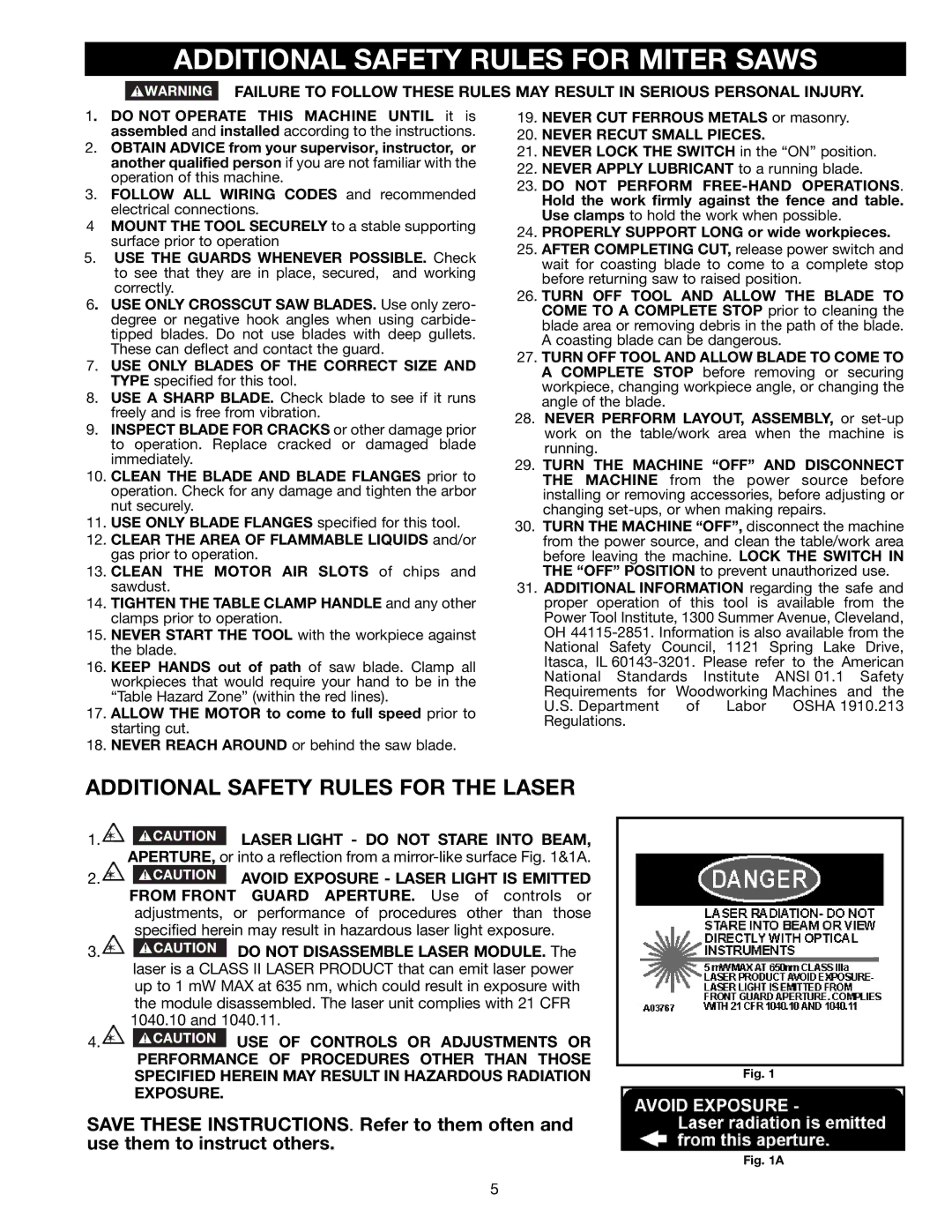
ADDITIONAL SAFETY RULES FOR MITER SAWS
FAILURE TO FOLLOW THESE RULES MAY RESULT IN SERIOUS PERSONAL INJURY.
1. DO NOT OPERATE THIS MACHINE UNTIL it is assembled and installed according to the instructions.
2.OBTAIN ADVICE from your supervisor, instructor, or another qualified person if you are not familiar with the operation of this machine.
3.FOLLOW ALL WIRING CODES and recommended electrical connections.
4MOUNT THE TOOL SECURELY to a stable supporting surface prior to operation
5.USE THE GUARDS WHENEVER POSSIBLE. Check to see that they are in place, secured, and working correctly.
6. USE ONLY CROSSCUT SAW BLADES. Use only zero- degree or negative hook angles when using carbide- tipped blades. Do not use blades with deep gullets. These can deflect and contact the guard.
7.USE ONLY BLADES OF THE CORRECT SIZE AND TYPE specified for this tool.
8.USE A SHARP BLADE. Check blade to see if it runs freely and is free from vibration.
9.INSPECT BLADE FOR CRACKS or other damage prior to operation. Replace cracked or damaged blade immediately.
10.CLEAN THE BLADE AND BLADE FLANGES prior to operation. Check for any damage and tighten the arbor nut securely.
11.USE ONLY BLADE FLANGES specified for this tool.
12.CLEAR THE AREA OF FLAMMABLE LIQUIDS and/or gas prior to operation.
13.CLEAN THE MOTOR AIR SLOTS of chips and sawdust.
14.TIGHTEN THE TABLE CLAMP HANDLE and any other clamps prior to operation.
15.NEVER START THE TOOL with the workpiece against the blade.
16.KEEP HANDS out of path of saw blade. Clamp all workpieces that would require your hand to be in the “Table Hazard Zone” (within the red lines).
17.ALLOW THE MOTOR to come to full speed prior to starting cut.
18.NEVER REACH AROUND or behind the saw blade.
19.NEVER CUT FERROUS METALS or masonry.
20.NEVER RECUT SMALL PIECES.
21.NEVER LOCK THE SWITCH in the “ON” position.
22.NEVER APPLY LUBRICANT to a running blade.
23.DO NOT PERFORM FREE-HAND OPERATIONS.
Hold the work firmly against the fence and table. Use clamps to hold the work when possible.
24.PROPERLY SUPPORT LONG or wide workpieces.
25.AFTER COMPLETING CUT, release power switch and wait for coasting blade to come to a complete stop before returning saw to raised position.
26.TURN OFF TOOL AND ALLOW THE BLADE TO COME TO A COMPLETE STOP prior to cleaning the blade area or removing debris in the path of the blade. A coasting blade can be dangerous.
27.TURN OFF TOOL AND ALLOW BLADE TO COME TO A COMPLETE STOP before removing or securing workpiece, changing workpiece angle, or changing the angle of the blade.
28.NEVER PERFORM LAYOUT, ASSEMBLY, or
29.TURN THE MACHINE “OFF” AND DISCONNECT THE MACHINE from the power source before installing or removing accessories, before adjusting or changing
30.TURN THE MACHINE “OFF”, disconnect the machine from the power source, and clean the table/work area before leaving the machine. LOCK THE SWITCH IN THE “OFF” POSITION to prevent unauthorized use.
31.ADDITIONAL INFORMATION regarding the safe and proper operation of this tool is available from the Power Tool Institute, 1300 Summer Avenue, Cleveland, OH
U.S. Department | of | Labor | OSHA 1910.213 |
Regulations. |
|
|
|
ADDITIONAL SAFETY RULES FOR THE LASER
1.![]()
![]() LASER LIGHT - DO NOT STARE INTO BEAM, APERTURE, or into a reflection from a
LASER LIGHT - DO NOT STARE INTO BEAM, APERTURE, or into a reflection from a
2.![]() AVOID EXPOSURE - LASER LIGHT IS EMITTED FROM FRONT GUARD APERTURE. Use of controls or adjustments, or performance of procedures other than those specified herein may result in hazardous laser light exposure.
AVOID EXPOSURE - LASER LIGHT IS EMITTED FROM FRONT GUARD APERTURE. Use of controls or adjustments, or performance of procedures other than those specified herein may result in hazardous laser light exposure.
3.![]() DO NOT DISASSEMBLE LASER MODULE. The laser is a CLASS II LASER PRODUCT that can emit laser power up to 1 mW MAX at 635 nm, which could result in exposure with the module disassembled. The laser unit complies with 21 CFR 1040.10 and 1040.11.
DO NOT DISASSEMBLE LASER MODULE. The laser is a CLASS II LASER PRODUCT that can emit laser power up to 1 mW MAX at 635 nm, which could result in exposure with the module disassembled. The laser unit complies with 21 CFR 1040.10 and 1040.11.
4.![]() USE OF CONTROLS OR ADJUSTMENTS OR PERFORMANCE OF PROCEDURES OTHER THAN THOSE SPECIFIED HEREIN MAY RESULT IN HAZARDOUS RADIATION EXPOSURE.
USE OF CONTROLS OR ADJUSTMENTS OR PERFORMANCE OF PROCEDURES OTHER THAN THOSE SPECIFIED HEREIN MAY RESULT IN HAZARDOUS RADIATION EXPOSURE.
SAVE THESE INSTRUCTIONS. Refer to them often and use them to instruct others.
Fig. 1
Fig. 1A
5
